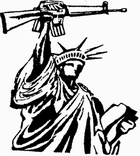Click Here to Puruse the old Flyover-press
Please Click ton Ab
Liberty knows no compromise
Click to Subscribe to Our Free Daily News Service
Donate today to help defray the costs of this important free newsletter
A Universal Ethic for All Mankind: A Detailed Review and Synopsis of The Ethics of Liberty
by Murray N. Rothbard
Chapter 12: Self-Defense
Compiled and Edited
by
Dr. Jimmy T. (Gunny) LaBaume
If every man has the absolute right to his justly-held property, then he has the right to keep that property and defend it by violence against violent invasion. Pacifists who profess to believe in property rights contradict themselves. To say that someone has the absolute right to a certain property but lacks the right to defend it is the same as saying that he does not have total right to that property. Furthermore, if every man has the right to defend his person and property, then he must also have the right to hire or accept the aid of other people to do such defending.
However, a man's right of self-defense extends only up to the point where he begins to infringe on the property rights of someone else.
Defensive violence may only be used against an actual or directly threatened invasion of property. It may not be used against any nonviolent “harm.” For example, to boycott in a non-invasive manner (even if for trivial or immoral reasons) may not be met with violence.
Invasive acts against person or property include two corollaries: (1) intimidation (a direct threat of physical violence) and (2) fraud ( the appropriation of property without consent which is “implicit theft”). For example, suppose someone takes out a gun and demands your wallet. He has used a threat which is equivalent to actual invasion.
The threat must be palpable, immediate, and direct. Any remote or indirect criteria is no more than an excuse for an invasive act. A major argument for the prohibition of alcohol was that imbibing increased the chances that (unspecified) people would commit crimes. Therefore, prohibition was claimed to be “defensive.” However, once “threats” are introduced that are vague and future (not overt and immediate) then all types of tyranny become excusable. The criterion for perceived invasion must be kept clear. It must be immediate and overt. This is the only way to guard against despotism. Further, the burden of proof that the other party initiated the aggression must be on the person who employs the defensive violence.
The concept of fraud as implicit theft is derived from the right of free contract which is, in turn, derived from private property rights. Failure to honor a contract for the exchange of property titles is tantamount to theft.
Fraudulent adulteration occurs if, for example, Smith pays Jones for a specified make of car but Jones actually delivers an older and poorer car. This is also implicit theft.
On the other hand, not all contracts must be enforceable. Specifically, contracts that do not involve implicit theft should not be enforceable. Examples might be an agreement to get married or a promise to give someone a sum of money sometime in the future. Anyone who breaks such a contract may be morally reprehensible but he has not implicitly stolen property. In other words, simple promises are not properly enforceable contracts.
Debt contracts are properly enforceable, not because they are promises but because the creditor's property is appropriated without his consent—i.e., stolen.
M aking people moral, truthful or to keep their promises is not the business of law . The only purpose for legal violence is to defend persons from violent attack, molestation or appropriation of their property.
So, how far does the right of violent defense go? First, the danger must be imminent, clear and present before coercive action may be taken against an invader.
Second, the claim that a storekeeper has the right to kill a kid for stealing a piece of bubble gum suffers from a grotesque lack of proportion. The storekeeper's right to his bubble gum is simply not proportional to the kids right of self-ownership. The criminal loses his own right only to the extent that he has deprived someone else of theirs. Going beyond that is, itself, an invasion of the person's property right. This is summarized in the old adage that says “let the punishment fit the crime.”
Should “inciting to riot” be a crime? That depends. Suppose Green exhorts a crowd to burn, loot and kill then has nothing further to do with these activities. Every man is free to choose (or not choose) any course of action. Therefore no one can say that Green determined the mob's behavior and make him responsible for their crimes. His was simply a pure exercise of a man's right to speak. On the other hand, if Green was involved in a plan or conspiracy then told his co-conspirators to proceed, he would be just as implicated as they are. In other words, there is a world of difference between the head of a criminal gang and a soap-box orator.
Along a different line, it is clear that every man has the absolute right to bear arms for self-defense (or any other licit purpose for that matter. B earing arms is not the crime. U sing them for threatened or actual invasion is.
Judicial proceedings are the most widely acceptable way to find out who the criminals are. However, no force may be used against non-criminals. For that would be an invasion of rights and therefore would, itself, be criminal. Examples of such invasion of rights would be the police torturing suspects or tapping phone lines—“innocent until proven guilty” is the standard. An exception would be, of course, a victim exercising self-defense on the spot against a criminal that he knows is invading his home.
The above discussion may be qualified under two conditions: 1) the police may use coercive methods provided that the suspect turns out to be guilty and 2) provided the police themselves are considered criminal if the suspect is not proven guilty. In other words, the rule of no force against non-criminals would still apply. In all cases the police must be treated in exactly the same way as anyone else. Every man has equal liberty and equal rights under the law.
Furthermore, the police can never be allowed to commit an invasion that is more than proportionate to the crime under investigation--for example beating and torturing someone charged with petty theft— even if the man is guilty.
In an attempt to exercise his right of self-defense, no man may coerce another into defending him. If he did, then he would, himself, be a criminal invader of the rights of the other person. So, this immediately rules out conscription because it enslaves men and forces them to fight on someone else's behalf. Furthermore, it also rules out one man compelling another to be a witness . No man has the right to force anyone else to speak on any subject. Thus, the prohibition against coerced self-incrimination should be extended to preserving the right not to incriminate anyone. No one, under any circumstance, should be compelled to say anything. The freedom to speak is meaningless without the corollary freedom to remain silent.
If no force may be used against a noncriminal, then the current system of compulsory jury duty must also be abolished. Just as conscription is a form of slavery, so too is compulsory jury duty. Precisely because being a juror is so important a service, the service must not be filled by resentful serfs. And how can any society call itself “libertarian” that rests on a foundation of jury slavery? In the current system, the courts enslave jurors because they pay a daily wage so far below the market price that the inevitable shortage of jury labor has to be supplied by coercion. The problem is very much the same as the military draft, where the army pays far below the market wage for privates, cannot obtain the number of men they want at that wage, and then turns to conscription to supply the gap. Let the courts pay the market wage for jurors, and sufficient supply will be forthcoming.
If there can be no compulsion against jurors or witnesses, it follows that subpoena power would be eliminated. Witnesses may be requested to appear. Furthermore, the same voluntarism would apply to the defendant since he has not yet been convicted of crime. The plaintiff would notify the defendant that he is being charged and that a trial will be getting underway. The defendant would be invited to appear. Then, if he chose not to defend himself the trial would proceed in absentia. Compulsion could only be used against the defendant after his conviction. A defendant could not be kept in jail before his conviction unless the jailer is prepared to face a kidnapping charge if the defendant turns out to be innocent.
Continue to the next chapter...
*Note: We hold no special government issued licenses or permits. We don't accept government subsidies, bailouts, low-cost loans, insurance, or other privileges. We don't lobby for laws that hurt our competitors. We actively oppose protectionism and invite all foreign competitors to try to under price us. We do not lobby for tariffs, quotas, or anti-dumping laws. We do not support the government's budget deficits: we hold no government or agency securities.
To Subscribe to our daily e-mail alert service, send an e-mail with the word "subscribe" on the subject line.
Visit Our Advertisers
Email for Advertising Rates
Use the link or send an email to: adinfo@flyover-press.com

